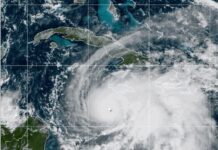The 2025 hurricane season is expected to produce up to five major hurricanes, posing significant challenges for meeting professionals planning events in coastal regions.
Despite these forecasts, the Spring 2025 Global Rescue Traveler Sentiment and Safety Survey reveals a concerning trend: More than half of travelers express minimal concern about natural disasters affecting their plans. According to the survey, 52 percent of respondents said they were concerned “a little” (20 percent) or “not concerned at all” (32 percent) about the effects of natural disasters on their future travel plans. This compares to 46 percent expressing concern, ranging from “a moderate amount” (22 percent) to “a great deal” (12 percent) or “a lot” (12 percent).
“Travelers are proceeding with their plans despite the risks of natural disasters. This is a testament to the resilience of the travel industry,” said Dan Richards, CEO of The Global Rescue Companies and a member of the U.S. Travel and Tourism Advisory Board at the U.S. Department of Commerce, in a press statement. “Whether it’s smoke from a wildfire closing down a national park or flooding rerouting an entire itinerary, travelers are seeing real-world effects. Even among those who don’t express concern, many are still experiencing the consequences firsthand.”
The Global Rescue survey indicates that nearly 40 percent of experienced travelers have faced trip disruptions due to extreme weather; however, meeting planners must prepare for potentially higher impacts, given their responsibility for large groups.
“As travel risks evolve—like natural disasters—proactive safety measures are no longer seen as a luxury but as a necessity for those navigating an unpredictable global landscape,” Richards noted in the survey report.
With nearly half of travelers concerned about natural disasters disrupting their trips and the other half unswayed about the effects of disaster-related travel interruptions, meeting planners have a critical role in attendee education and preparation.
Hurricane Preparedness Essentials for Meeting Planners
- Diversify your weather information sources. Recent funding cuts have impacted the National Oceanic and Atmospheric Administration’s (NOAA) forecasting capabilities. Supplement official forecasts with private weather services like AccuWeather and The Weather Company. The European Centre for Medium-Range Weather Forecasts (ECMWF) often provides excellent hurricane tracking. Local destination meteorological services can offer precise regional insights.
- Build venue-specific evacuation procedures. Work with each venue to create detailed evacuation plans accounting for all meeting spaces. Identify shelter locations, transportation options and municipal emergency resources. Share these plans with your planning team and key stakeholders.
- Implement a decision timeline protocol. Establish clear decision points for potential cancellation or relocation, such as 96 hours, 72 hours, 48 hours and 24 hours before the event. Define specific criteria triggering each level of response to avoid last-minute chaos.
- Create weather-specific force majeure clauses. Develop contract language that explicitly addresses hurricane scenarios. Include provisions for partial refunds, rescheduling options and circumstances qualifying as “cancellation due to natural disaster” versus a postponement.
- Develop an attendee communication system. Develop a multi-channel approach to reach all participants during emergencies quickly. Test your emergency notification system before the event and ensure you have alternative communication methods in place if cellular networks become compromised.
- Incorporate weather insurance into your budget. Weather-specific event cancellation policies are crucial for meetings during hurricane season. Many standard event insurance policies exclude named storms unless the policy is purchased before the hurricane is identified.
- Establish supplier partnerships focused on flexibility. Build relationships with experienced venues, caterers and AV companies that are well-equipped to handle weather disruptions. Discuss hurricane scenarios during contracting and identify potential alternative dates in advance.
- Design program flexibility into your agenda. For events in high-risk periods (August through October), create modular agendas that can function with shortened timeframes or adjusted schedules. Have indoor alternatives for outdoor functions.
- Create comprehensive emergency resource packets. Provide both digital and physical materials containing emergency contact information, details about local medical facilities, evacuation routes and shelter locations. Include these in registration materials and make them accessible through your event app.
- Develop post-disruption recovery plans. Establish procedures for event continuation after disruption, including virtual contingencies, condensed programming options, and communication templates ready to deploy as needed.









